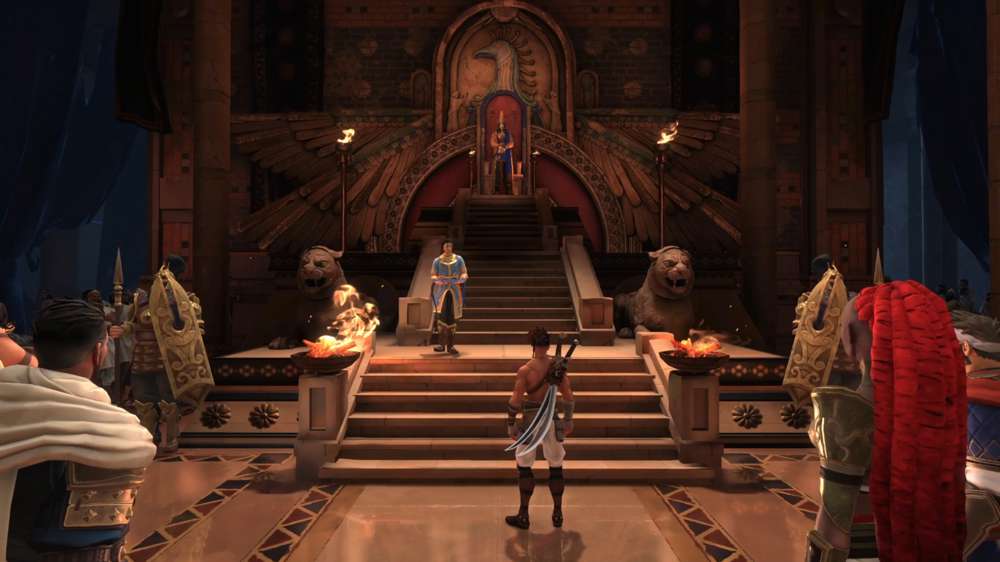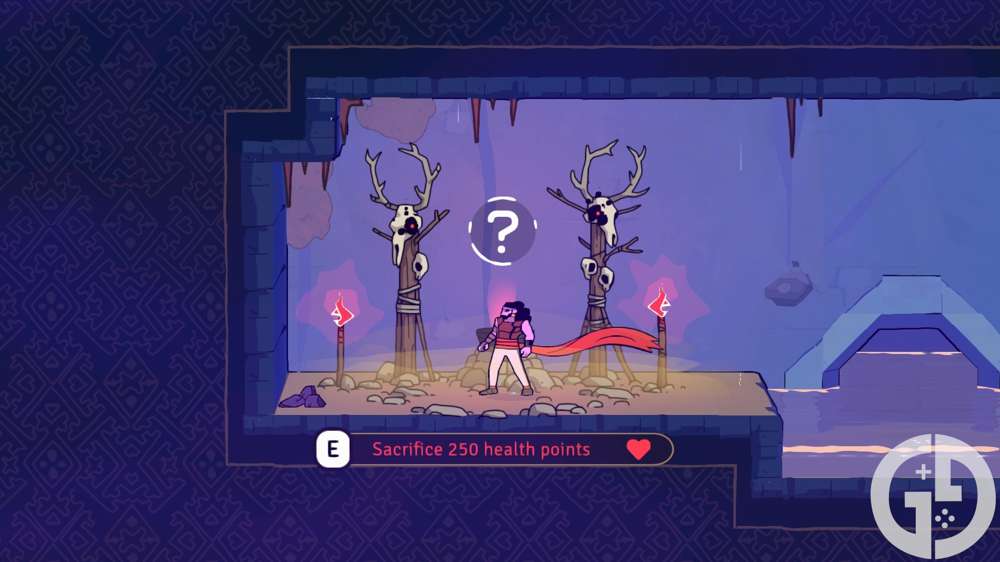Prince of Persia: The Lost Crown review - The best gaming comeback in years
It's tempting for me to say that Prince of Persia is back with the release of The Lost Crown and leave it at that. But that feels like a disservice to a game so boldly different from its predecessors because ultimately it's more than that. While it certainly still feels like a Prince of Persia game at the core, it stands on its own merits as a consistently brilliant and challenging Metroidvania experience, holding its own against some of the genre's very best.

It's tempting for me to say that Prince of Persia is back with the release of The Lost Crown and leave it at that. But that feels like a disservice to a game so boldly different from its predecessors because ultimately it's more than that.
While it certainly still feels like a Prince of Persia game at the core, it stands on its own merits as a consistently brilliant and challenging Metroidvania experience, holding its own against some of the genre's very best.
Images via Ubisoft
Franchise
Prince of Persia
Platform(s)
Nintendo Switch, PlayStation 4, PlayStation 5, Windows, Xbox One, Xbox Series X/S
Released
18/01/2024
Developer
Ubisoft Montpellier
Genre
Action-Adventure, Platformer
Publisher
Ubisoft
Engine
No
Multiplayer
Unity
ESRB
Teen, Blood, Mild Language, Violence
Ubisoft hasn't covered itself in glory over recent years, largely thanks to many of its titles following a similar template, and despite my positive preview of Prince of Persia: The Lost Crown, a part of me was still expecting it to let me down somewhere. That part of me couldn't have been more wrong.
Instead, the team at Ubisoft Montpellier delivered one of the most exciting comeback games for a franchise since Resident Evil 7, and I can't recommend it enough.
GGRecon Verdict
It's tempting for me to say that Prince of Persia is back with the release of The Lost Crown and leave it at that. But that feels like a disservice to a game so boldly different from its predecessors because ultimately it's more than that.
While it certainly still feels like a Prince of Persia game at the core, it stands on its own merits as a consistently brilliant and challenging Metroidvania experience, holding its own against some of the genre's very best.
Forgotten sands

Prince of Persia: The Lost Crown throws you into the mythical world of Mount Qaf, an ancient citadel in Persia that's been long forgotten since the death of King Darius and the disappearance of a god called the Simurgh.
You'll play Sargon, a warrior who is part of Persia's elite protectorate, the Immortals. Essentially, one of the Immortals kidnaps the current prince and takes him to Mount Qaf, leading the gang to follow along before splitting up to search the citadel and find the prince.
There's a short, linear tutorial that introduces you to basic movement and combat, but after 30 minutes or so it's right into the thick of it, and you're introduced to the semi-open world to explore and conquer.
While the game is connected by name to the older Prince of Persia titles, there aren't a whole lot of similarities outside of a focus on parkour and movement, and a fantasy Persian setting. The Lost Crown features new characters, a new 2.5D perspective, and a Metroidvania-inspired world design, making it feel like a necessary overhaul after years of dormancy.
As I mentioned in my preview though, Prince of Persia and Metroidvania design sensibilities just make sense together, and I'm more convinced of that than ever after spending 30 hours engrossed in its world and captivated by its gameplay.
The shadow and the flame

Mount Qaf is a treat to explore and look at, and during a playthrough, you'll visit 13 unique regions, home to their own enemies, quests, collectables, and gameplay challenges. You start on the fairly standard streets of a Persian city, but it soon branches out to forests, temples, and mountain peaks as you navigate around the world. All of these environments look beautiful with the game's stylised, painterly aesthetic, especially the grandness of the Achaemenid architecture and the more fantastical areas that I won't spoil here.
While most of the locations feel different from each other, they never feel totally separate, and thanks to clever level design and the hallmarks of gated Metroidvania progression, everything connects into a seamless whole that's more than the sum of its parts. Emphasis on seamless too, as there are no loading screens, even when teleporting between fast travel points. It helped to keep up the momentum and really sold the arduous journey Sargon undertakes.
New areas open up new possibilities, but they also provide new pathways and shortcuts to old ones, creating a sense of mastery of the world that runs in tandem with your mechanical progression as you pick up new movement abilities and combat.
These new abilities (of which there are six in total) recontextualise older areas, letting you move through them in completely new ways, nullifying older routes as you create more efficient ones and discover new areas previously inaccessible. It's all standard Metroidvania design and to anyone familiar with the genre, you won't be surprised by a lot of what's on offer here, but nevertheless, a well-made game is a well-made game, and The Lost Crown managed to impress me over and over with its consistency and quality in these areas.
Warrior within

When you think of Prince of Persia as a series, parkour likely comes to mind first; after all, it helped to popularise that kind of movement in the gaming mainstream. Thankfully, The Lost Crown upholds this legacy with the type of snappy and responsive movement that remains gleefully satisfying throughout.
Mount Qaf and its regions are a parkour playground, and with each new power you acquire the ceiling for skilled movement is only raised. The devs aren't afraid of challenging you either, as there are some hellishly difficult jumping puzzles and trap rooms in the game where precision and quick reflexes really count. It never lets you rest and just go through the motions, demanding your attention and focus much of the time, and the experience is all the better for it.
This also ties into many of the collectibles, because if you want a chance of even getting near 100% completion, you'll need to master the movement. Collectables can often feel like afterthoughts in games, tacked on to extend the playtime, but they are intrinsic to this game's experience and seamlessly integrated as just another challenge to conquer on your journey.
This proclivity to challenge doesn't just stop at movement, as the combat and boss fights are even more punishing for the player. Early on, it can be tempting to think spamming your standard combo will get you far, but many enemies require learning different tactics as they can block attacks, counter, and some of them move just as well as Sargon can.
This culminates especially with the boss battles, almost to the point where I wonder if Ubisoft Montpellier is exclusively staffed with sadists. Boss fights require every tool in your playbook, with use of your unlocked abilities being requirements due to some of the insane attack patterns and moves they pull out.
However, there were some issues I ran into regarding combat and bosses. One relates to a specific mechanic for recovering from attacks that send you flying in a given direction, allowing you to dash out of the animation and keep fighting. I'm unsure if this was a bug or just an ability that requires inhuman timing, but it was inconsistent every time I used it. This was especially annoying in a late-game boss fight that required it to dodge a move, and was one of the few times I felt powerless not because I wasn't good enough, but because the game felt unfair.
Some boss encounters are also sullied by overdrawn cinematics for certain moves. For example, many bosses can trigger a special move that you need to dodge, as getting hit will play a small cutscene where you take a chunk of damage. I appreciated the stylistic decision to include these, but considering how hard these bosses are, seeing some of those cutscenes over and over got tiresome really quickly.
The Verdict

It's tempting for me to say that Prince of Persia is back with the release of The Lost Crown and leave it at that. But that feels like a disservice to a game so boldly different from its predecessors because ultimately it's more than that.
While it certainly still feels like a Prince of Persia game at the core, it stands on its own merits as a consistently brilliant and challenging Metroidvania experience, holding its own against some of the genre's very best.
4.5/5
Reviewed on PC. Code provided by the publisher.
Comments




